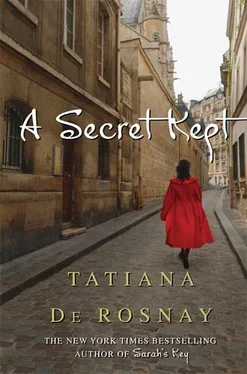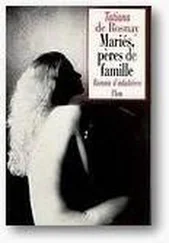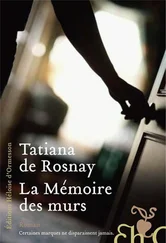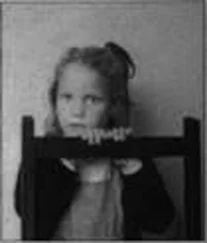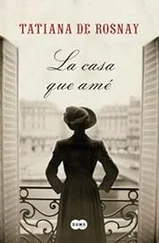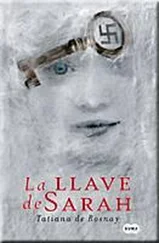He remembered that Blanche was adamant about the children having to wait at least two hours after lunch before they could swim. It was terribly bad to swim right after a meal, she said over and over again. So they would build endless sand castles and wait. Such a long wait. But sometimes Blanche fell asleep. There she was, openmouthed under her parasol, sweltering in her long skirt and tricot vest, her city shoes dusty with sand, her knitting askew in her lap. Solange was off on one of her shopping sprees and would later come back to the hotel laden with goodies for everyone. Robert had strolled back to the hotel, smoking his Gitanes, his straw hat tilted far back over his head. Clarisse would whistle to the children, jerk her chin toward the sea. “But we’ve got to wait another half hour!” Antoine would whisper. And Clarisse would flaunt a devilish smile at him. “Oh yes? Who says?” And they would all three of them tear off silently to the water, leaving Blanche snoring in the shade.
“Do you have any photos of her?” asked Antoine. “I only have a couple.”
“Very few,” said Mélanie.
“I can’t believe we don’t have more photos of our mother.”
“We don’t,” she said.
A toddler next to them wailed as it was dragged out of the water by a red-faced woman.
“There are no photographs of her anymore in the avenue Kléber apartment.”
“But there used to be,” he replied, getting agitated. “The one of you, me, and her at the Jardin d’Acclimatation, on the little train. What happened to that one? And the one of their wedding?”
“I don’t remember those.”
“They were in the entrance and on Father’s desk. But they all disappeared after her death. The albums as well.”
He wondered where those photos and albums were now. What could their father have done with them?
There was nothing to prove that Clarisse had lived at avenue Kléber for ten years, that this had been her home.
Régine, their stepmother, had taken over, had redesigned the place and erased every single trace of François Rey’s first wife, Clarisse. And it was only now that Antoine fully realized all this.

I sometimes wonder, when I lie in your arms, if I was ever happy before. I mean, before I met you, a year ago. I must have felt happy, seemed happy, always considered myself a happy person, and yet everything I have experienced before you seems stale and flat. I can imagine your perfect left eyebrow riding up the way it does when you flash that ironic smile. I don’t care, these letters will be destroyed anyway, torn to a thousand pieces, so I can write what I want.
I was a happy child in my village overlooking the river, and we spoke with that coarse southern accent that my husband’s family disapprove of because it is not Parisian, not chic. I am not stupid, you know. If I didn’t look the way I do, they would never have accepted me. They put up with the accent because I look pretty in a cocktail dress. Because I am pretty. No, I am not vain, and you know that. You know soon enough that you are pretty. You can tell by the way people look at you. That will happen to my daughter. She is so young still, only six, but she will be beautiful. Why am I telling you all this? You don’t care if I come from the south and if I have the wrong accent. You love me the way I am.

They had dinner in the pink dining room. Antoine had wanted to reserve “their” table, but they were told by the buxom young lady that the table was for large familles. The room filled up with children, couples, old people. Mélanie and Antoine sat back and watched. Nothing had changed. They smiled as they looked over the menu.
“Remember the Grand Marnier soufflé?” whispered Antoine. “We had it once, only once.”
Mélanie laughed. “How could I ever forget the Grand Marnier soufflé?”
The waiter bringing it, solemn, ceremonious, the other diners mesmerized by the orange and blue flames. A hush falling over the room. The dish was placed in front of the children. Everybody holding their breath.
“We were such a perfect family,” said Mélanie ironically. “Perfect in every way.”
“Too perfect, you think?” he said.
She nodded. “Yes. Boringly perfect. Look at your family. That’s what I call a real family-kids with personalities, tempers, kids who are sometimes outspoken-but that’s what I like about them. Your family is what I call perfect.”
He felt his face sag and tried to smile. “Mel, I’m no longer a family.”
She put a hand in front of her mouth.
“Tonio, I’m so sorry. I guess I still can’t quite accept the divorce.”
“Neither can I,” he said.
“How are you bearing up?”
“Let’s talk about something else.”
“Sorry.”
She hurriedly patted his sleeve. They ordered and ate in silence. Antoine felt the emptiness of his life taking over again. He wondered whether this void was the onslaught of a midlife crisis. Probably. A man with just about everything in his life gone to pot. A wife who had left him for another guy. A job as an architect that he no longer found any pleasure in. How did that happen? he thought. He had fought so hard to create his own company. It had taken him so long to get his foot in the door, had demanded such relentless effort. And now it was as if all his juices had dried up. It all seemed stale, flat. He no longer even wanted to work with his team, give the orders, get on with the building sites, do all the stuff that his position demanded. He no longer had the energy. It had withered away.
He remembered that party he had gone to last month where he had been confronted with the friends of his past, people he hadn’t seen since he was fifteen years old, all from his old school, the rigorous Collège Stanislas, notorious for the excellence of its results, its grueling religious education, and the inhumanity of its professors (“French without fear and Christian without reproach” was the grim school motto). He had been found on the Internet by Jean-Charles de Rodon, a greasy teacher’s pet he had never liked, and had meant to turn down the invitation to a dinner party with “all the gang,” but the sight of his forlorn living room had coerced him into saying yes. And he found himself seated at a round table in an overheated apartment near the Parc Monceau, surrounded by long-married couples who appeared to be steadfastly producing heirs and had raised pitying eyebrows at the mention of his divorce. Never had he felt more left out. His school friends had turned into balding, self-satisfied well-to-do bores, all in finance, insurance, and banking, and their high-maintenance wives were perhaps even worse, ensconced in Parisian finery and engrossed in detailed conversations that invariably concerned the upbringing of children.
How he had missed Astrid that evening, Astrid and her unconventional clothes: her dark red velvet redingote that made her look like a Brontë heroine, her flea market trinkets, her leggings. How he missed her jokes, her earthy laugh. In order to get away as fast as possible, he had mumbled something about an early start. Relief swamped him as he drove through the deserted streets of the seventeenth arrondissement. He far preferred his empty rooms to another half hour with Monsieur de Rodon and his crowd.
As he had drawn near Montparnasse, an old Stones song that he loved was played on Radio Nostalgie. “Angie.” He sang along.
He had almost felt happy.

Antoine had trouble falling asleep that first night at the Hotel Saint-Pierre. Yet there was no noise. The old place was silent, calm. His first night here since 1973. The last time he slept under this very roof, he thought, he was nine years old and his mother was still alive. There was something disquieting about that.
Читать дальше
